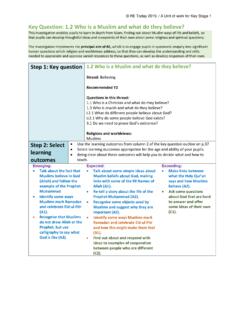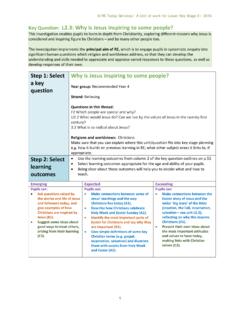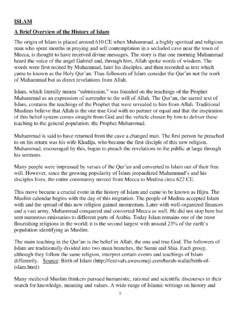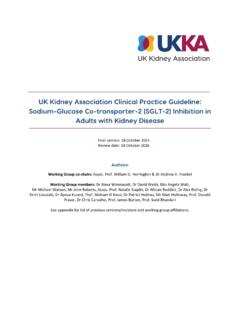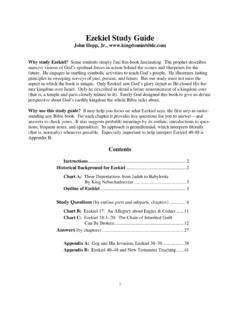Transcription of Why are festivals important to religious communities key ...
1 RE Today Services / A Unit of work for Lower Key Stage 2 / 2016 1 Key Question: Why are festivals important to religious communities This investigation enables pupils to learn in depth from different religious and spiritual ways of life as shown through festival and celebration. We have chosen to focus on Easter, Divali in Hinduism, Pesach in Judaism and Eid ul Fitr in Islam. Schools are free to choose to study other festivals as shown in the syllabus however the learning exemplified in this unit focuses on these 4 festivals . There are links to literacy, art and philosophy for children within this unit.
2 This unit enables pupils to begin to understand how celebration reminds believers of key beliefs and gives time to focus on beliefs and commitments and celebrating as a believing community. The focus is on the key elements of festival-shared values, story, belief and hopes and commitments. This unit may be studied as a whole unit or maybe split and studied as a series of festival focussed learning days around the times of the festival being studied. The investigation implements the principal aim of RE, which is to engage pupils in systematic enquiry into significant human questions which religion and worldviews address, so that they can develop the understanding and skills needed to appreciate and appraise varied responses to these questions, as well as develop responses of their own.
3 Step 1: Select a key question Why are festivals important to religious communities Year group: Recommended Year 3 and 4 Strand: Expressing Questions in this thread: F4 Which times are special and why? How and why do we celebrate special and sacred times? Is it better to express your beliefs in arts and architecture or in charity and generosity? How can people express the spiritual through the arts? Religions and worldviews: Christians plus Hindus and/or Jewish people and/or Muslims (other examples can be selected by the school) Many schools will decide to split this unit teaching about some festivals in Year 3 and some in Year 4.
4 This also allows schools to learn about festivals close to the time they are being celebrated by religious communities . Schools should ensure that there is progression in pupils learning across the age range. Make sure that you can explain where this unit/question fits into key stage planning how it builds on previous learning in RE; what other subject areas it links to, if appropriate. Step 2: Select learning outcomes Use the learning outcomes from column 2 of the key question outlines on Select learning outcomes appropriate for the age and ability of your pupils.
5 Being clear about these outcomes will help you to decide what and how to teach. Emerging Expected Exceeding Recognise and identify some differences between religious festivals and other types of celebrations (B2). Retell some stories behind festivals ( Christmas, Divali, Pesach) (A2). Make connections between stories, symbols and beliefs with what happens in at least two festivals (A2). Ask questions and give ideas about what matters most to believers in festivals ( Easter, Eid) (B2). Identify similarities and differences in the way festivals are celebrated within and between religions (A3).
6 Explore and suggest ideas about what is worth celebrating and remembering in religious communities and in their own lives (C1). Discuss and present their own responses about the role of festivals in the life of Britain today, showing their understanding of the values and beliefs at the heart of each festival studied, using a variety of media (C2). Suggest how and why religious festivals are valuable to many people (B2). RE Today Services / A Unit of work for Lower Key Stage 2 / 2016 2 Step 3: Select specific content Look at the suggested content for your key question, from column 3 in the unit outlines.
7 Select the best content (from here, or additional information from elsewhere) to help you to teach in an engaging way so that pupils achieve the learning outcomes. This plan has selected the following content to exemplify the learning outcomes. Pupils will: Think about times in their own lives when pupils remember and celebrate significant events/people, and why and how they do this Consider the meanings of the stories behind key religious festivals , Christmas, Easter, Pentecost, Harvest in Christianity, Diwali in Hinduism, Pesach, Rosh Hashanah and Yom Kippur in Judaism, Eid in Islam.
8 Describe how believers express the meaning of religious festivals through symbols, sounds, actions, story and rituals. notice and think about similarities and differences between the way festival are celebrated Christmas or Holy Week within different Christian traditions; between home and places of worship. study key elements of festival: shared values, story, beliefs, hopes and commitments. Consider (using Philosophy for Children methods where possible) questions about the deep meaning of the festivals : does light conquer darkness (Diwali)? Is love stronger than death (Easter)?
9 Can God free people from slavery (Pesach)? Is it good to say sorry (Yom Kippur)? Does fasting make you a better person? How? (Ramadan and Eid-ul-Fitr; Lent). Explore the benefits of celebration to religious communities by asking some local believers: why do they keep on celebrating ancient events? Consider questions about the role of festivals in the life of Britain today: Is Comic Relief day a bigger festival than Easter? Should everyone be allowed a day off work for their festivals ? Is Christmas for the Christians or for everyone? Can the real meaning of a festival be preserved, or do the shops and shopping always take over?
10 NOTE: This unit of work offers around 8-10 of classroom ideas. You need to select from it in order to achieve the learning outcomes set out in Step 2 above. Remember this unit can be split over two years. Note the overlap with unit which explores Easter in the context of Jesus s life. RE Today Services / A Unit of work for Lower Key Stage 2 / 2016 3 Step 4: Assessment: write specific pupil outcomes Turn the learning outcomes into pupil-friendly I can or You can statements. You might adapt these specific outcomes to form I can statements (for pupil self-assessment), You can statements (for teacher assessment), and Can statements (for next steps or challenge) Make the learning outcomes specific to the content you are teaching, to help you know just what it is that you want pupils to be able to understand and do as a result of their learning.
